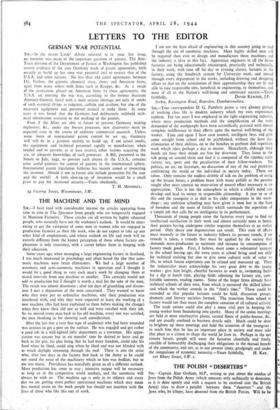confirm. For ten years I was employed in the light
engineering industry, where mass production methods and the simplification of the tasks demanded of the workpeople have been scientifically pursued with almost complete indifference to their effects upon the mental well-being of the worker. Time and again I have seen normal, intelligent boys and girls come straight from school and be pitchforked, without the least dis- crimination of their abilities, on to the benches to perform dull repetition work which takes perhaps a day to master. Henceforth, although their hands are busy their minds are free for diversion. They listen to the talk going on around them and find it is composed of the cinema; radio variety, sex, sport and the peculiarities of their fellow-workers. No politics, no art, no literature, no discussion of any of the real problems confronting the world or the individual in society today. These are taboo. Only remains the endless dribble of talk on the problem of using up the leisure hours, a problem beset with many pitfalls as the pastime sought after must contain no reservation of mental effort necessary to its appreciation. This is not the atmosphere in which a child's mind can develop and lead its owner to responsible citizenship. A year or so of this and the youngster is as dull as his older companions in the work- shops ; any ambition schooling may have given is soon lost in the haze of boredom and the sense of futility which- surrounds the repetition of a simple job that calls for no intelligence in its performance.
Thousands of young people enter the factories every year to find no intellectual satisfaction in their work and almost certainly none at home, their parents having undergone similar negation themselves at an earlier period. Only decay and degeneration can result. This state of affairs must intensify in the future as industry follows its present trends, if no remedy is taken, a remedy that must be applied by the society that demands mass-production to maintain and increase its consumption of factory made goods. First, I believe, must come a substantial increase in the school leaving age, the extra years at school being used not only for technical training but also to give some cultural scale of value to life, to which future experience can be related and measured up. Then the industrialist must acknowledge his very great debt to the young worker: give him bright, cheerful factories to work in, swimming baths for a dip at lunch time, playing fields adjoining the factory site, com- fortable canteens, reading rooms. Some of the larger firms already have technical schools of their own, from which is recruited the skilled labour and which the worker attends in the " firm's time." These could be extended so that popular lectures could be held, discussion groups, dramatic and literary societies formed. The transition from school to factory would not then mean the complete cessation of all cultural activity.
The trade unions could also play a more vital part in keeping the young worker from floundering into apathy. Many of the union meetings are held in most unattractive places, second floors of public-housei, &c., and are usually confined to business details only. Much could be done to brighten up these meetings and hold the attention of the yOungster ; to teach him that he has an important place in society and must take that place as a citizen to shape the world he lives in. Perhaps in the not remote future, people will enter the factories cheerfully and freely, sensible of honourably discharging their obligations to the mutual benefit of the community, and not, as in our present times, grudgingly and under the compulsion of economic necessity.—Yours faithfully, H. KAY. 107 Ebury Street, S.W. 1.


























 Previous page
Previous page